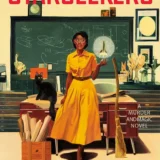“I cannot live without books..” is a famous quote from Thomas Jefferson in a letter to fellow ex-president John Adams. Book lovers cling to this claim as a personal motto. I collect bookmarks and use most of them. One of my more cherished items is a bookmark from the Library of Congress (a gift from my son) with this quote on it. But what many people may not realize or is that there was more to Jefferson’s comment than what is written on this bookmark. Upon closer examination in this reader sensitive PC environment, we find that one of our founding fathers might have dissed genre fiction right after providing us with our book lover’s creed. Ouch.
A brief history: After the invading British Regulars burned the book collection of the Library of Congress in August of 1814, the private collection of Jefferson consisting of 6,487 volumes was purchased by the government for the hefty sum of $23,950. According to the Library of Congress, John Adams wrote a letter to Thomas Jefferson on October 28, 1814 following the sale of Jefferson’s library to Congress.
“By the Way I envy you that immortal honour: but I cannot enter into competition with you for my books are not half the number of yours.”
This confession of humility between competitive aristocrats is indicative of their hubris. It was almost eight months before Jefferson replied. And it was from this reply letter dated June 10, 1815 where we book lovers have drawn one of our most coveted mottos.

“I have met with, and very kindly and opportunely offered me the means of reprocuring some part of the library treasures which I have ceded to Congress to replace the devastations of British Vandalism at Washington. I cannot live without books, but fewer will suffice where amusement, and not use, is the only future object. I am about sending him a catalogue to which less than his critical knolege of books would hardly be adequate.
Present my high respects to mrs Adams and accept yourself the assurances of my affectionate attachment. Th. Jefferson”
Both former Presidents demonstrated a fondness for grandeur. But the statement that “fewer will suffice where amusement, and not use, is the only future object” makes me wonder just what Jefferson was alluding to. Common belief is that he is referring to his own loss of a collection that no longer served a purpose to him other than pride. The devils advocate in me points out that he could be talking about the actual content of the books. Was Jefferson showing disrespect toward literary works focused on “amusement” and art in lieu of those centered on more practical applications? How would compassionate fans of today react if one of the living ex-presidents released this statement today?
Granted the contribution was a noble gesture and important to the revitalization of the nation’s literary collection. I get it. But the deal wasn’t exactly a donation either. Jefferson was educated and well off financially, so considering the dollar value of $23,950 is over $300,000 today, the splendor of the gesture is slightly diminished.
Considering it did not take long for the man to begin replenishing his personal loss, it both defends his declaration that he could not live without books and yet contradicts his posture that fewer will suffice. That is, unless he considered “amusement” as entertaining literature and “fewer” of these books would be fine. There were scores of editions regarding history and philosophy in Jefferson’s collection, but what about the works of literature he possessed that was considered entertainment? Perhaps Jefferson believed the likes of Homer, Milton, Chaucer and Shakespeare as amusing and unnecessary.
Though the genre of science fiction would follow Jefferson’s famous quote by almost a century, it would be interesting to know how it would have read if it was written today. I’d like to think he would have been an avid member of fandom had the genre been available in his time. Surely the likes of Wells and Verne would have made him reconsider giving up his “entire” collection. Personally, I think he would have suggested using Adam’s collection to replenish the Library of Congress. If anything, his letter might have been worded a little differently as to avoid the wrath of furious Twitter, Facebook and other hordes of interweb followers.








